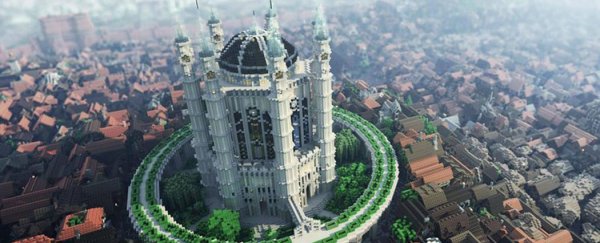Far from the old stereotypes that video games can only have negative social and developmental effects on children, Australian researchers are now looking at kids' unswerving devotion to Minecraft to investigate what potential educational initiatives the hugely successful sandbox game could help deliver in the classroom.
"Educators have a great interest in Minecraft because children and young people seem to be driven to learn new knowledge and skills to play the game with a passion that they often lack for their everyday schooling," writes Michael Dezuanni from the Queensland University of Technology (QUT) at The Conversation this week. "There is no doubt that it is possible to align learning within Minecraft to curriculum outcomes. A growing number of schools are designing curriculum in the key learning areas using Minecraft."
While Minecraft's survival mode - in which players have to defend themselves from spawning night monsters - might resemble the simplistic kind of arcade combat contained in thousands of previous computer games, other more cerebral aspects of the game are focused around freeform creative pursuits. In-game activities such as building, designing, engineering, and collaborating have prompted educators' belief that the game holds all sorts of untapped learning potential that could be leveraged for school-based lessons.
"Like Lego, Minecraft is an imagination system for applying design possibilities and then displaying the outcomes for others to see. Unlike Lego, though, Minecraft allows creative media production on a massive scale," says Dezuanni. "In this sense, Minecraft is not so much a game, but a social network that values and circulates expertise."
Microsoft, which owns the game after having acquired the original developers Mojang last year in a multi-billion-dollar deal, is welcoming educators' enthusiasm. In March the company held the first Minecraft Education Summit in Los Angeles, which it has now followed up with a new web portal for teachers interested in exploring the educational possibilities Minecraft allows.
But it's still early days in terms of looking at Minecraft as a teaching platform, Dezuanni acknowledges. Despite the seeming potential, teachers will need to thoroughly learn how the game works and avoid stripping the fun out of it while they somehow surreptitiously slip their lesson plans in. And furthermore, no research has yet concluded that Minecraft is able to improve student performance.
"Despite these challenges, there is no doubt something is going on with Minecraft and learning," says Dezuanni. "Young Minecraft players have a passion for acquiring knowledge and skills in new and complex ways that teachers should not ignore."
Find out more about how QUT research is making a difference in education.
